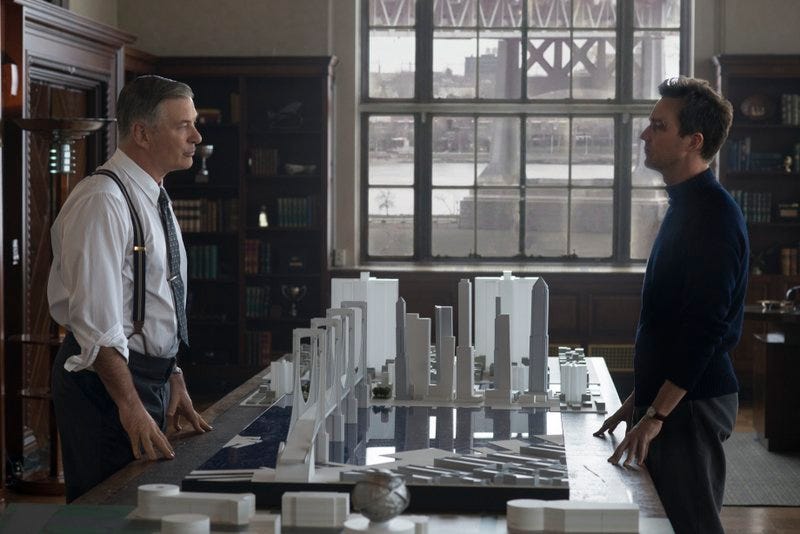Motherless Brooklyn

A chaotic film sometimes requires a chaotic review—fair warning: my thoughts will likely be a little more scattered even than the film itself, as I attempt to parse through this Goldbergian mystery caper with a brain already well-used this week.
First thing's first: writer, director, and lead actor Edward Norton's clear strength is in the 1-on-1, man-to-man, display-of-power scenes. I think it'd be a disservice to call his writing "Sorkin-esque" in these moments, but it possesses the same quality of poetic rhythm and verbal gymnastics, without the pompous self-showcasing and "look how well I speak" bravado. There's an elegance in the way Norton writes his characters to undermine, subvert, and react to one another. It's far from naturalistic, and yet wholly convincing in the hands of this stellar cast.
Speaking of casting: Alec Baldwin, as Borough Authority commissioner Moses Randolph. He's the best thing in the movie. One of those almost bit-roles in a film that wouldn't be inappropriate as inclusions on the Best Supporting Actor nomination list.
Okay—maybe I'm being gratuitous with my praise there, but the man literally stops the movie where it is and just... takes control, every time he opens his mouth. The physicality he applies to this mogul—tyrant, rather—makes the character truly visceral in his calloused, entirely-self-justified evil. His thick, treelike fingers wrapped around his thighs or poised for attack on the surface of a desk (see above) are merely one example of how Baldwin entirely takes on the body of a character for which power over others means everything. OK—Baldwin rave over.
What is this movie even about? Good question. It's like a classic, noir gumshoe story with a bunch of extra, unnecessary (but not entirely unwanted) subplots thrown in.
Norton plays Lionel: a nervous-tic-laden employee of a small, five-man detective joint that finds himself looking for answers when his boss, investigator Frank Minna (Bruce Willis), is killed by some sleazy-looking suits during a deal gone wrong.
Lionel's colleagues at the L&L detective agency are quick to write it off as a tragic case of Frank getting in over his head and not leaving himself an out. But Lionel feels impassioned to do for Frank what he believes Frank would do for him: get to the bottom of it.
What he ends up getting into is what ultimately makes the film so dense; the answers to his questions lead him to a wide, sometimes impossibly diverse range of subjects: social activists, city planners, the New York Borough Authority, jazz musicians, and a disgraced civil engineer.
Norton—as the writer, adapting a screenplay from Jonathan Lethem's novel of the same name—seems to be executing a top-to-bottom investigation of class and racial tension from the poor and dejected to the rich and powerful. It's an admirable endeavor, working in commentary on those with the unquenchable thirst for control and superiority, but it falls a little bit short in saying anything especially meaningful about socioeconomics or social politics.
As mentioned previously, Norton's strength (again, as a writer) is in his "man-to-man" dialogue, and that holds true in a literal sense as well. Scenes between Lionel and social activist Laura Rose (Gugu Mbatha-Raw) are considerably more milquetoast and conventional than those between Lionel and Moses Randolph (Baldwin) or the enigmatic sage, Paul (Willem Dafoe).
There's a lot of wonderful dialogue throughout; stuff that works as showy, picked-out snippets (as can be seen in Christopher Lloyd's review) as well as more subtle revelatory conversation.
Also consistently strong are the atmospherics of the film. Cinematographer Dick Pope shoots much of the film in an unassuming but purposeful way, but leans harder into noir aesthetics as the film progresses toward its finale. The jazzy soundtrack and impeccable production design make for a detective caper that feels warm and familiar without being needlessly nostalgic.
Ultimately, Motherless Brooklyn wrestles with too many thematic and narrative ideas, and too many characters meant to be meaningfully connected, to really stick the landing. But it'd be absurd to claim the film didn't have quite a lot of interesting elements on display. That said, it strikes me as the kind of movie to be much more appreciated by old detective movie enthusiasts and hard cinephiles—for its gumshoe trappings and filmmaking craft, respectively—than by general audiences, whom I think might get bored or confused, if not both. I know I found myself there a few times.



